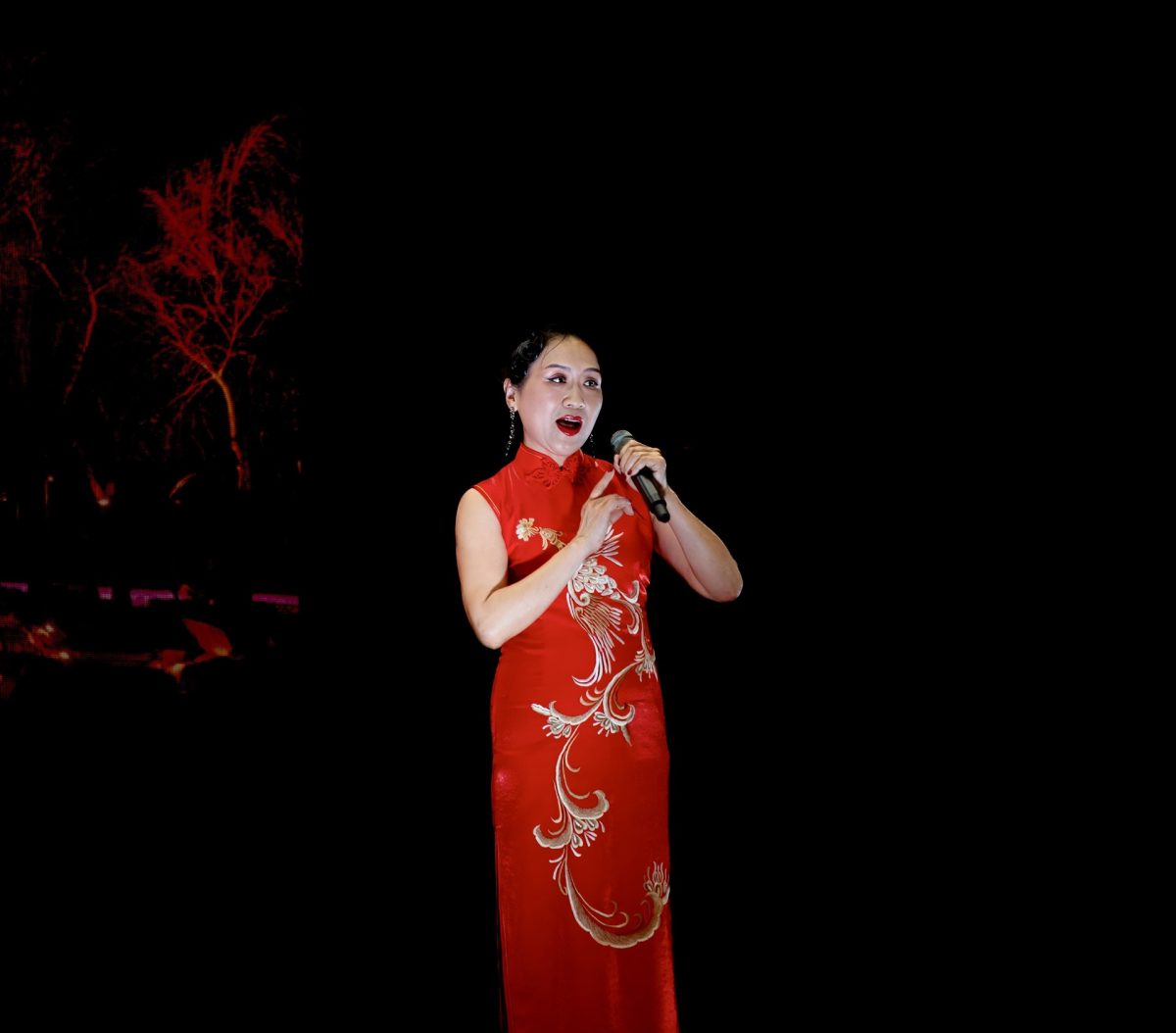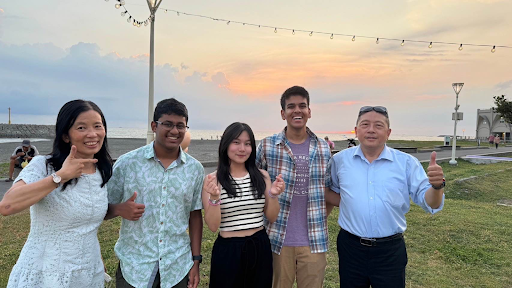Waking up the next morning was going to be hard. It was 10 p.m. and he had to get up in only seven hours. Ivan Dam (11) had just flown from Kaohsiung, Taiwan to Memphis, Tennessee — just in time for his first day of school.
Over the summer, Dam traveled to Kaohsiung, Taiwan where he studied Mandarin through the National Security Language Initiative for Youth (NSLI-Y) program. NSLI-Y takes American high schoolers across the world for two months so that they may learn new languages or refine their skills in those they already know. The program also enables students to experience a culture that is different from their own while serving as citizen ambassadors for the USA.
“Living in another country is pretty cool; it’s like a once-in-a-lifetime opportunity,” Dam said. “You get to see another culture, so you kind of have like a more open mind. Also, people in [NSLI-Y] are from all across the USA and all from different backgrounds, so you kind of become more inclusive of other people as a result of the program.”
Prior to attending NSLI-Y, Dam had taken high school-level Chinese classes at White Station High School (WSHS). He originally decided to take Chinese to fulfill WSHS’s language requirement of two or more years of foreign language classes and because some of his friends speak the language.
“I can hold a basic conversation [in Mandarin],” Dam said. “I could ask for directions if I’m lost, I could order something at a restaurant. Like before this program, we had to take a test to see our level of proficiency in the language, so before I was not this high [level], and now I’m like intermediate-mid which is a pretty big [difference].”
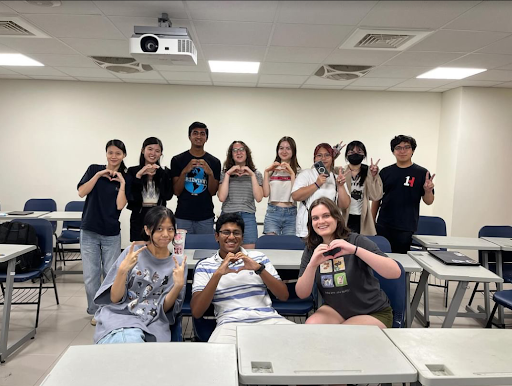
Those applying to NSLI-Y must meet certain requirements to be eligible for the program. For example, applicants must be USA citizens, current high schoolers, have a minimum GPA of 2.5 and meet other criteria designated by that year’s application. If students meet these requirements, they must complete two main steps: three essays and an online interview.
“The first thing was to write three essays — that was the first round,” Dam said. “After that … you do an online interview and they ask you questions like ‘oh, if you were in this situation, what would you do?’ and they ask you questions about your personality, or like ‘what do you do in your community?’ and then after that you find out if you get in or not a month later.”
In Taiwan, Dam lived with a host family consisting of a host dad, mom and sister. Host families volunteer to take care of traveling students, providing them with housing and food. Dam’s host family had been hosting for around 10 years. His host dad knew very little English which made it difficult to communicate, but his host mom knew more English. Dam had a housemate who was also a NSLI-Y participant.
“The host dad was kind of strict … [while the host mom] was very kind; she would like cut fruit for us every single day for dinner,” Dam said. “One time I asked for this one Indian food and she somehow found it. She said she searched for like three hours to find that, so that was pretty cool. And then our host sister, I think she’s like 23 … She told us about Taiwan’s traditions and stuff like that. If we had any questions, she was someone we could ask. She’s very kind, very outgoing, very patient.”
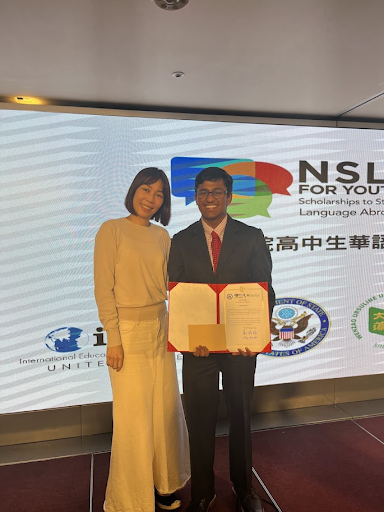
As part of the program, Dam attended a Taiwanese high school, Monday through Friday, from 9 a.m. to 3 p.m. Throughout the day, he studied Mandarin in Chinese class, had a one-hour lunch break and attended culture class. He had little contact with his friends and family in the USA due to the time zone difference — Taiwan is 14 hours ahead of the USA — and Taiwan’s poor internet connection.
“I was feeling homesick, so I missed my parents and my brother, and also my mom’s cooking because my mom’s cooking is super healthy and the Taiwanese food is all super oily,” Dam said. “It was kinda weird being in an entirely new situation with new people like everything is just completely new. There’s no familiarity at all, so I kind of missed that about the US[A].”
There are numerous cultural differences between Taiwan and the USA — or between any two countries. Public transportation in the USA, for example, is often used reluctantly as many citizens have their own vehicles. Private transportation is also encouraged in the USA due to the long commutes most citizens make each day. In smaller, more densely populated places like Taiwan, public transportation is more commonly used and appreciated.
“One [difference between Taiwan and the USA] was that the public transportation [in Taiwan] is like awesome,” Dam said. “So like everything is super cheap and everything is always on time; it’s super convenient … The other thing was convenience stores. Over here in the US[A], when you think of a convenience store like 7-Eleven … you don’t wanna be there really late. But in Taiwan, convenience stores are everywhere and they’re very clean, like you can get metro passes at a convenience store; you can get a quick meal at a convenience store.”
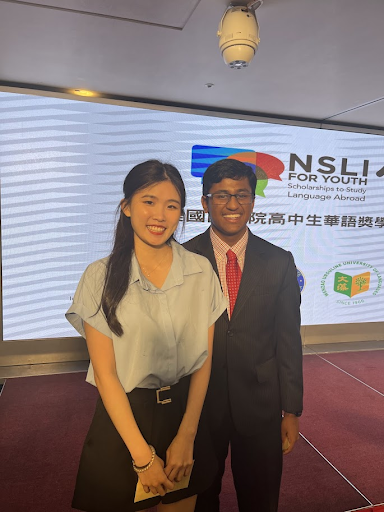
NSLI-Y allowed Dam to experience not only cultural characteristics but also the social sides of Taiwan. He often played badminton after school with a group of friends, receiving a hoodie as a gift from one badminton player’s brother. Additionally, Dam was able to purchase tea from a local shopkeeper thanks to his improved Mandarin abilities and the weekly $90 stipend provided by the American government.
“One thing I really liked is [the] high school exchange [in Taiwan],” Dam said. “We went to a local high school and saw … the daily life of a Taiwanese high schooler. We [also] did … some traditional things. We made this Taiwanese jelly … did Taiwanese dancing … [and] we [showed them] line dancing. We also had American pizza and hotdogs and stuff like that.”
Being in a brand-new environment requires adaptation — especially if the location is far from home. Dam’s time in Taiwan enabled him to build new relationships, hone his language skills and tell new stories when he got back home. Living across the world for an extended period of time might seem daunting, especially without family and friends, but the experience may be life-changing.
“I feel like the program is awesome because you can immerse yourself in [a specific] language,” Dam said. “That’s the best way to improve; if you’re constantly speaking Chinese, you’re going to get better like really quickly, versus if you’re in the States and just speak English all the time and have Chinese like one hour of the day. So if you are looking to improve your … language ability a lot in that certain language, you should apply for the program. Also, it’s super fun with a cool group of people … and everything’s paid for.”











